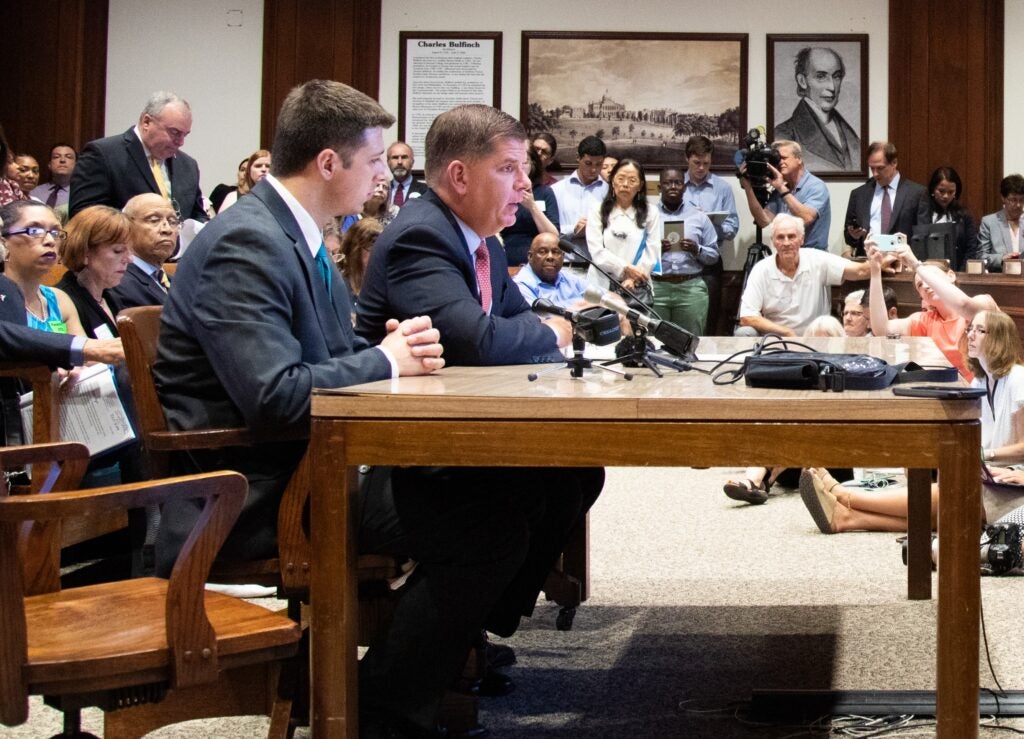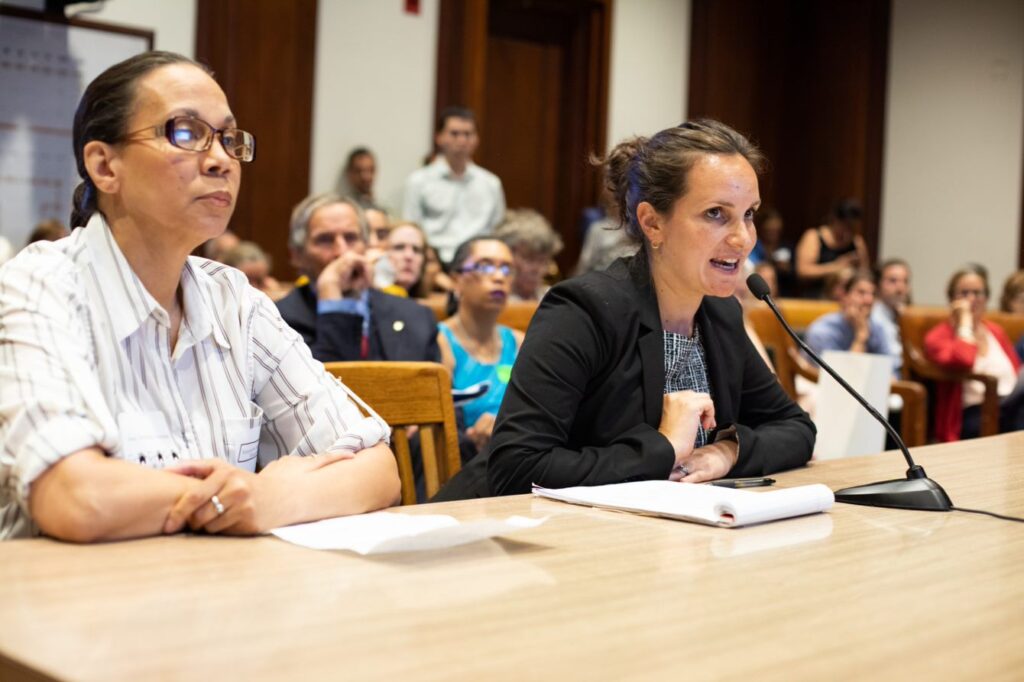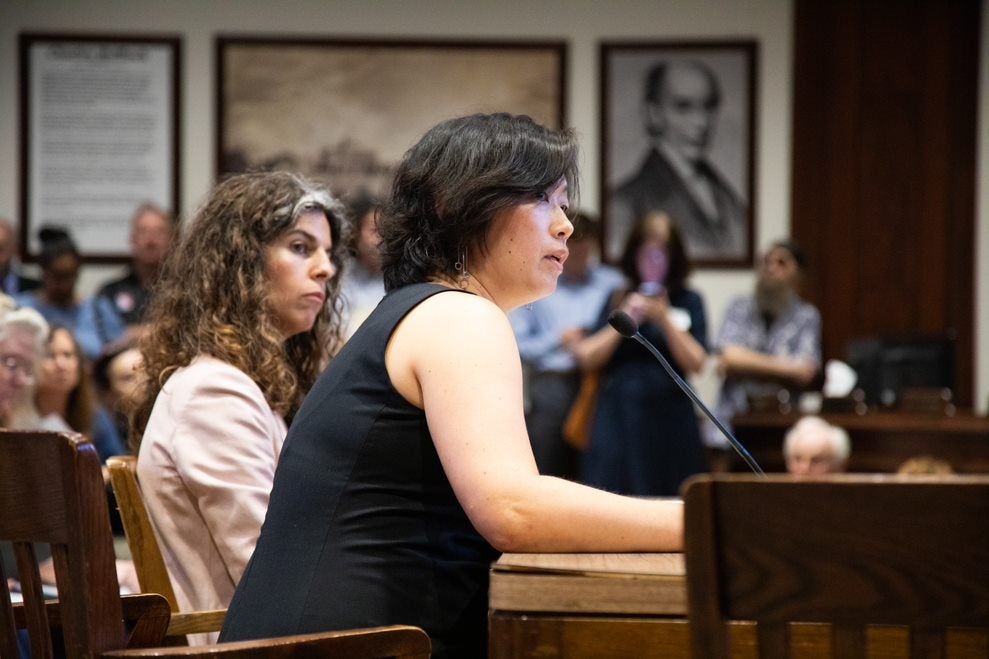Via Harvard Law Today
By: Alexis Farmer

Four Harvard Law School clinicians—Esme Caramello, Patricia Whiting and Nicole Summers from the Harvard Legal Aid Bureau (HLAB) and Shelley Barron from the Tenant Advocacy Project (TAP)—presented testimony before the Massachusetts Joint Committee on the Judiciary on a series of housing bills aimed at tenants facing eviction.
On July 16, the clinicians provided remarks in support of bills requiring tenants facing eviction to have a right to counsel and sealing eviction records. HLAB testified against four rent escrow bills. Nearly 100 people, including community organizers, legal aid lawyers, legislators, and Boston Mayor Marty Walsh attended the hearing.
Right to Counsel
In 2018, more than 92% of tenants who faced eviction were unrepresented according to the Massachusetts Right to Counsel Coalition. Unable to afford an attorney, most tenants represent themselves, even though they are often unfamiliar with the legalese and processes of the court. Legal services organizations like HLAB, TAP and the Housing Law Clinic at the Legal Services Center (LSC) fill in the gap by providing pro bono representation to tenants, but they say their limited capacity constrains them from taking on the number of clients that request their services.

Rep. David M. Rogers (D-Middlesex), Rep. Chynah Tyler (D-Suffolk),and Sen. Sal DiDomenico (D-Everett) are sponsoring bills that would ensure the right to counsel in eviction proceedings. If a tenant cannot afford an attorney, one will be appointed for them, similar to defendants in criminal cases. Studies in Massachusetts and other stateshave shown that tenants with representation have a better chance of reaching agreements with landlords to stay in their homes and avoid having an eviction on their record.
Also in favor of the resolution was TAP Clinical Instructor Shelley Barron. She told the committee, “low-income tenants should have a fair and meaningful chance at preserving their affordable housing. The right to a legal advocate will go a long way to ensuring access to justice for low-income tenants in the Commonwealth.” She also stated lawyers can help tenants before problems escalate to the point of court intervention.

Challengers questioned whether the state should be funding legal representation for one side of the case. Supporters argued that the bill includes provisions for low-income landlords to have a right to counsel. Barron says, “A right to counsel is not the only policy option to help keep families housed, but studies have indicated it is a concrete way to reduce homelessness. It’s also a matter of dignity, of ensuring that vulnerable tenants have a voice in an overwhelming and imbalanced system.”
Mayor Walsh urged the committee to look seriously into the legislation, stating that, “this is not about stacking the deck in favor of a tenant, it’s about ensuring equal justice under the law.” HLAB Clinical Instructor Nicole Summers suggested a plan of implementation to ensure courts and legal service providers have time to adjust.
Other bills that ensure a right to counsel include H. 1537 and S. 913.
The HOMES Act—An Act Promoting Housing Opportunity and Mobility Through Eviction Sealing
The HOMES Act (H.3566/S.824) sponsored by Rep. Michael J. Moran (D-Suffolk) and Sen. Joseph Boncore, (D-Suffolk and Middlesex) would seal eviction proceedings. In a study by the Massachusetts Law Reform Institute (MLRI) at least 1 million eviction cases have been filed in Massachusetts since 1988. The records of those eviction cases remain online forever, regardless of the outcome.

The “Scarlet E,” as it’s known, is said to create barriers to housing, allowing prospective landlords to reject potential tenants. Records of an eviction can also impact tenants’ credit scores, their ability to secure loans, and employment opportunities. The HOMES Act would seal eviction cases once they are filed and would only be unsealed when a judge makes a ruling and finds fault, such as if a tenant has failed to pay rent or violated a condition of their lease. Eviction case records would be publicly available for three years then sealed. Sealed records could be released for governmental, journalistic, or research purposes. The bill would also make it illegal to name minors or others not responsible for rent as a defendant in an eviction case.
Mayor Walsh, Boston City Council Representative Lydia Edwards, the ACLU of Massachusetts, community organizations like the Chelsea Collaborative and even a few landlords supported the bill. Tenants and lawyers shared experiences about the damaging consequences an eviction record can have on finding new housing for veterans, domestic violence survivors, individuals with disabilities, college-bound students, and low-income women of color. Esme Caramello, Clinical Professor and Faculty Director of HLAB, pushed the urgency of the issue, calling it an “an invisible crisis.”
Opponents say that eviction records hold important information for landlords about the past behavior of potential tenants. Landlords in favor of the bill listed alternative ways of getting the same information to check the credibility of potential clients, such as a credit checks. Caramello says the act would protect tenants from being unfairly branded with an eviction record for the rest of their lives. “The idea is that even if we made a mistake or fall on hard times, we can move on with our lives at some point,” she told the committee.
Rent Escrow
Clinical Instructor Pattie Whiting spoke out against four rent escrow bills being considered by the committee, including one sponsored by Nicolas Boldyga (R-Hampden). Massachusetts law allows tenants to withhold rent when the landlord fails to make necessary repairs or address sanitary code violations. The statute that the mandatory rent escrow bills seek to amend, is a crucial tool for ensuring that residential rental properties are kept in habitable condition, Whiting said. As currently written, the statute provides both a mechanism for tenants to enforce the State Sanitary Code and a disincentive for landlords to let properties fall into disrepair.
Whiting argued that the proposed legislation imposes additional and unnecessary procedural prerequisites on tenants seeking to withhold rent and/or raise their poor living conditions as a defense to an eviction action. For example, requiring a board of health inspection report prior to withholding, requiring a second written notice to the landlord after the board of health inspection, and escrowing all of the rent claimed to be due by the landlord. “The vast majority of tenants would not be able to comply with these procedural requirements,” Whiting said, “particularly those who are disabled, illiterate or who do not speak English.” If a tenant failed to comply with the law as proposed, they would be denied the right to present their case in court, which advocates say undermines the statutory intent of ensuring that residential dwellings are maintained in habitable condition.
A Large Base of Support
Barron left the hearing hopeful. “Often for housing legislation, we’re playing defensively…but today we were pushing for exciting innovations and trying to improve access to justice for low-income tenants,” she said. Barron and Caramello were both encouraged by the large turnout of tenants, community groups, and government officials. Caramello noted, “The packed hearing highlighted the urgency of the work of building fairness into our lopsided eviction system.”
The committee will decide which bills will be reported out of the committee and advance to the floor for a vote. The last day for the formal session of the legislature is November 20.
Filed in: In the News, Legal & Policy Work
Tags: Esme Caramello, Harvard Legal Aid Bureau, Nicole Summers, Pattie Whiting, Shelley Barron, Tenant Advocacy Project
Contact Office of Clinical and Pro Bono Programs
Website:
hls.harvard.edu/clinics
Email:
clinical@law.harvard.edu
